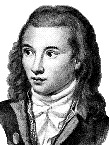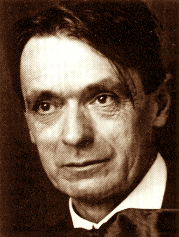
Novalis

Steiner
| Re-Animation of Nature |
The Romantic movement, with its theory of the power of imagination, had, as its central historical mission, the resuscitation of a qualityless world, "a world drained of its immanent life by the very evolution which enabled them to perceive its deadness" (BAR 36). When Romanticism came of age in the thought of Rudolf Steiner, so too, did the concept of humankind's messiahship:
For Anthroposophy and for Barfield:The spirit of man was . . . for Steiner not only a microcosm; it was a microcosm into which a dying natural world had long been slowly withering. And he gave all the energy of his own life to the task of proclaiming that this withering process can only be arrested and reversed by the energy of the microcosm--of man himself! Thus, the Spirit of man was, for him, really a seed or germ, out of which the dying Spirit of nature seeks to be reborn. (RCA 238)
Man has not only to know nature; he has to reawaken her. But this he can only do by knowing her--truly knowing her--knowing her in depth. And this re-awakening, which began only when the conscious gaze of poets and artists first rested on her sleeping form in admiration and rapture--this will continue . . . until she stirs, and opens her eyes, and arises again in strength, in the strength of the Spirit of Man, to walk hand in hand with science now, as well as with art. (RCA 238-39)
| See in particular "Man, Thought, and Nature" (RCA 223-40), Unancestral Voice, passim, Saving the Appearances, passim. |